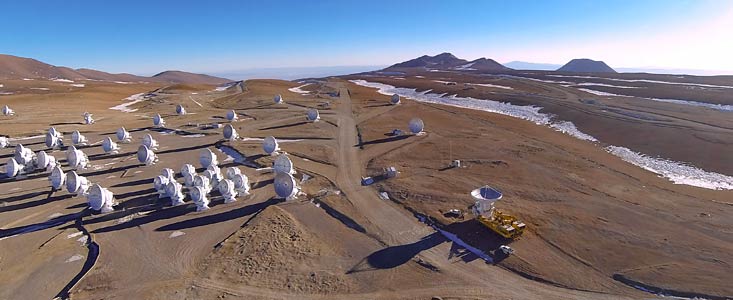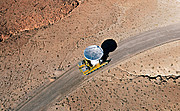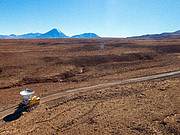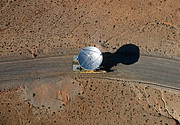Anuncio
Ultima antena de ALMA llega al Llano de Chajnantor
16 de Junio de 2014
La última antena requerida para el proyecto Atacama Large Millimeter/submillimeter Array (ALMA), ha sido transportada hasta el sitio a gran altura del observatorio, ubicado a 5.000 metros sobre el nivel del mar. Con el arribo de esta antena finaliza el complemento de las 66 antenas que comprende ALMA en el Llano de Chajnantor, situado en el Desierto de Atacama, en el Norte de Chile. En el futuro, las antenas funcionarán en conjunto, como un solo telescopio gigante.
La antena número 66 de ALMA ha sido transportada hasta el Array Operations Site (AOS). Esta había sido entregada al Observatorio ALMA para sus pruebas finales, en octubre del 2013 (eso1342).
El plato de 12 metros de diámetro es la antena europea número 25, y la última que debía ser transportada hasta el Llano de Chajnantor. Operará en forma conjunta con las otras antenas europeas entregadas anteriormente, como también con las 25 antenas de 12 metros proporcionadas por Norteamérica y las 16 antenas proporcionadas por Asia del Este (cuatro antenas de 12 metros y doce de 7 metros).
La colaboración global de ALMA es el proyecto astronómico con base en tierra de mayor envergadura en la actualidad. La última antena europea fue fabricada por el Consorcio Europeo AEM[1], como parte del mayor contrato concedido por ESO hasta el momento, el cual comprendía el diseño, fabricación, transporte e integración de las 25 antenas en el sitio.
El Observatorio ALMA fue inaugurado por el Presidente de Chile, Sebastián Piñera, en marzo de 2013. Dicho evento marcó la culminación de todos los sistemas principales del telescopio gigante y la transición formal de un proyecto en construcción a un observatorio completamente operativo.
“Este acontecimiento marca el punto final de muchos años en que se han transferido sistemas y componentes con tecnología de vanguardia, hasta Chajnantor, y es un hito importante para el proyecto ALMA. Ahora todas las antenas de ALMA se encuentran disponibles para ser integradas a las operaciones”, dijo Wolfgang Wild, Gerente Europeo de Programas para ALMA.
ALMA sondea el Universo utilizando luz en longitudes de onda milimétricas y submilimétricas, ubicadas entre la luz infrarroja y las ondas de radio en el espectro electromagnético. La luz en estas longitudes de onda se origina en enormes nubes frías en el espacio interestelar y desde algunas de las galaxias más tempranas y remotas del Universo. El telescopio proporcionará a los astrónomos una ventana hacia el misterioso Universo frío, donde yacen los secretos de nuestros orígenes cósmicos, aún por descubrir.
Notas
[1] El Consorcio AEM está compuesto por Thales Alenia Space, European Industrial Engineering, y MT-Mechatronics.
Información adicional
La instalación astronómica internacional ALMA, es una asociación entre Europa, Norteamérica y Asia del Este, en cooperación con la República de Chile. La construcción y las operaciones de ALMA, en nombre de Europa, se encuentran a cargo de European Southern Observatory (ESO), en nombre de Norteamérica son responsabilidad del Observatorio Radio Astronómico Nacional (NRAO), y a nombre de Asia del Este corresponden al Observatorio Astronómico Nacional de Japón (NAOJ). El Observatorio ALMA proporciona el liderazgo unificado, como también la gestión de la construcción, la puesta en marcha y las operaciones de ALMA.
ESO es la organización astronómica intergubernamental más importante en Europa y el observatorio astronómico en tierra más productivo del mundo. Cuenta con el respaldo de 15 países: Alemania, Austria, Bélgica, Brasil, República Checa, Dinamarca, Francia, Finlandia, Italia, Holanda, Portugal, España, Suecia, Suiza y el Reino Unido. ESO lleva a cabo un ambicioso programa centrado en el diseño, construcción y operación de poderosas instalaciones para la observación astronómica en tierra, permitiendo así a los astrónomos realizar importantes descubrimientos científicos. ESO también juega un papel fundamental en promover y organizar la cooperación para la investigación astronómica. ESO opera en Chile tres instalaciones de observación únicas en el mundo: La Silla, Paranal y Chajnantor. En Paranal, ESO opera el Very Large Telescope (VLT), el observatorio óptico más avanzado del mundo, y dos telescopios de rastreo. El telescopio VISTA, que funciona en longitudes de onda infrarrojas, es el telescopio de rastreo más grande a nivel mundial y el VLT Survey Telescope (VST) es el telescopio de mayor tamaño diseñado para rastrear de manera exclusiva los cielos en luz visible. ESO es el socio europeo del revolucionario telescopio ALMA, el proyecto astronómico de mayor envergadura que existe. En la actualidad, ESO se encuentra desarrollando el European Extremely Large optical/near-infrared Telescope (E-ELT) de 39 metros, que será “el ojo más grande del mundo para mirar el cielo”.
Enlaces
Contactos
Wolfgang Wild
Gerente Europeo de Programas para ALMA,ESO
Garching bei München, Alemania
Tel: +49 89 3200 6716
Email: wwild@eso.org
Stefano Stanghellini
Gerente Proyecto Antenas de ALMA, ESO
Garching bei München, Alemania
Tel: +49 89 3200 6570
Email: sstanghe@eso.org
Richard Hook
Encargado de Prensa ESO
Garching bei München, Alemania
Tel: +49 89 3200 6655
Celular: +49 151 1537 3591
Email: rhook@eso.org
Sobre el anuncio
| Identificador: | ann14048 |
Our use of Cookies
We use cookies that are essential for accessing our websites and using our services. We also use cookies to analyse, measure and improve our websites’ performance, to enable content sharing via social media and to display media content hosted on third-party platforms.
ESO Cookies Policy
The European Organisation for Astronomical Research in the Southern Hemisphere (ESO) is the pre-eminent intergovernmental science and technology organisation in astronomy. It carries out an ambitious programme focused on the design, construction and operation of powerful ground-based observing facilities for astronomy.
This Cookies Policy is intended to provide clarity by outlining the cookies used on the ESO public websites, their functions, the options you have for controlling them, and the ways you can contact us for additional details.
What are cookies?
Cookies are small pieces of data stored on your device by websites you visit. They serve various purposes, such as remembering login credentials and preferences and enhance your browsing experience.
Categories of cookies we use
Essential cookies (always active): These cookies are strictly necessary for the proper functioning of our website. Without these cookies, the website cannot operate correctly, and certain services, such as logging in or accessing secure areas, may not be available; because they are essential for the website’s operation, they cannot be disabled.
Functional Cookies: These cookies enhance your browsing experience by enabling additional features and personalization, such as remembering your preferences and settings. While not strictly necessary for the website to function, they improve usability and convenience; these cookies are only placed if you provide your consent.
Analytics cookies: These cookies collect information about how visitors interact with our website, such as which pages are visited most often and how users navigate the site. This data helps us improve website performance, optimize content, and enhance the user experience; these cookies are only placed if you provide your consent. We use the following analytics cookies.
Matomo Cookies:
This website uses Matomo (formerly Piwik), an open source software which enables the statistical analysis of website visits. Matomo uses cookies (text files) which are saved on your computer and which allow us to analyze how you use our website. The website user information generated by the cookies will only be saved on the servers of our IT Department. We use this information to analyze www.eso.org visits and to prepare reports on website activities. These data will not be disclosed to third parties.
On behalf of ESO, Matomo will use this information for the purpose of evaluating your use of the website, compiling reports on website activity and providing other services relating to website activity and internet usage.
Matomo cookies settings:
Additional Third-party cookies on ESO websites: some of our pages display content from external providers, e.g. YouTube.
Such third-party services are outside of ESO control and may, at any time, change their terms of service, use of cookies, etc.
YouTube: Some videos on the ESO website are embedded from ESO’s official YouTube channel. We have enabled YouTube’s privacy-enhanced mode, meaning that no cookies are set unless the user actively clicks on the video to play it. Additionally, in this mode, YouTube does not store any personally identifiable cookie data for embedded video playbacks. For more details, please refer to YouTube’s embedding videos information page.
Cookies can also be classified based on the following elements.
Regarding the domain, there are:
- First-party cookies, set by the website you are currently visiting. They are stored by the same domain that you are browsing and are used to enhance your experience on that site;
- Third-party cookies, set by a domain other than the one you are currently visiting.
As for their duration, cookies can be:
- Browser-session cookies, which are deleted when the user closes the browser;
- Stored cookies, which stay on the user's device for a predetermined period of time.
How to manage cookies
Cookie settings: You can modify your cookie choices for the ESO webpages at any time by clicking on the link Cookie settings at the bottom of any page.
In your browser: If you wish to delete cookies or instruct your browser to delete or block cookies by default, please visit the help pages of your browser:
Please be aware that if you delete or decline cookies, certain functionalities of our website may be not be available and your browsing experience may be affected.
You can set most browsers to prevent any cookies being placed on your device, but you may then have to manually adjust some preferences every time you visit a site/page. And some services and functionalities may not work properly at all (e.g. profile logging-in, shop check out).
Updates to the ESO Cookies Policy
The ESO Cookies Policy may be subject to future updates, which will be made available on this page.
Additional information
For any queries related to cookies, please contact: pdprATesoDOTorg.
As ESO public webpages are managed by our Department of Communication, your questions will be dealt with the support of the said Department.






